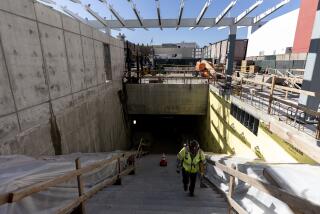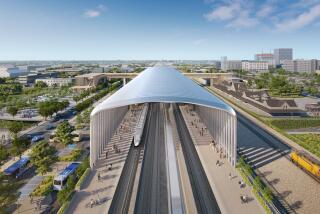Editorial: Pull the plug on the 710 tunnel
There have been many death knells for the 710 Freeway extension to Pasadena over the decades. The proposal to “close the gap” — by building the final 4.5-mile stretch to connect the 710 to Interstate 210 — has been part of a state master plan since the 1950s, but has been stymied repeatedly by neighborhood opposition and lack of funds. Still, 710 devotees have always managed to revive the project, most recently as a $5.6-billion tunnel proposal.
But now, an important long-standing supporter of the 710 extension — Duarte City Councilman and Metropolitan Transportation Authority Board Chairman John Fasana — has decided the tunnel has no future. Let’s hope he’s right, and that the project is really, truly dead.
Currently, the 710 ends suddenly in Alhambra, spilling traffic into the streets; the tunnel was supposed to go beneath Alhambra, South Pasadena and Pasadena, bringing cars directly to the 210.
But even Fasana now sees that there’s no path forward for the tunnel, and recently proposed that Metro scrap it. Instead, he says it should use the roughly $700 million allocated to the 710 project for traffic signals, street widening, freeway ramp improvements and other fixes to ease congestion. This was one of the options studied in the project’s environmental impact report.
The era of building new freeways is probably over.
Fasana says he still believes the tunnel would the best option to ease traffic, but his motion is an acknowledgement of the cold, hard reality: The project doesn’t have the money or the political support to get built.
Metro has only about $1 billion of the $5.6 billion needed to build the tunnel. The rest of the money would have to come from public-private investment partnerships, in which the private sector has expressed little interest, or from government funding. But the Measure M sales tax increase passed last year includes no money for the tunnel. There also isn’t enough support for the project on the 13-member Metro board, especially since the city of Los Angeles has officially opposed the freeway extension. And even if the tunnel project did miraculously move forward, opponents would inevitably sue, again, tying things up in court indefinitely.
There are many good reasons why the project isn’t worth pursuing. The tunnel (which would be the longest in California) would be an enormous public investment without a significant payoff for the region. Heavy trucks would most likely be banned from using the route for safety and operational reasons, so freight traffic would still clog the adjacent freeway routes. The tunnel would alleviate congestion from cut-through traffic on surrounding city streets — but only if drivers chose to pay the tunnel toll to save an estimated 13 minutes in their travels.
And there’s a good chance that closing the freeway gap wouldn’t do that much to ease traffic in the long run. Highway planners are increasingly talking about “induced demand.” That’s when a road is built or widened to ease congestion, but instead it persuades more people to drive, which results in similar or worse congestion than before the project. The theory is that a slight reduction in congestion encourages people to drive when they might have otherwise skipped the trip, used transit or traveled at a less busy time. More driving also means more air pollution and greenhouse gas emissions, which would be at odds with California’s aggressive efforts to slow climate change.
The 710 extension may have made sense years ago when Southern California still believed its future depended on freeways. If a highway was the only efficient way to move people and goods then perhaps a $5 billion tunnel to connect two routes would be a worthy expenditure. But to their credit, that’s not the way planners and government officials see the world anymore, and the era of building new freeways is probably over. Instead, Los Angeles County is spending billions of dollars to build a network of light rail and subway lines to give people alternatives to driving. There have been investments made to move more freight by train. Plus, in an increasingly dense region, it’s extraordinarily difficult to take out homes or businesses to build more highways.
After half a century of fighting, it’s clear that the 710 extension should never — and will never — be built.
Follow the Opinion section on Twitter @latimesopinion and Facebook
More to Read
A cure for the common opinion
Get thought-provoking perspectives with our weekly newsletter.
You may occasionally receive promotional content from the Los Angeles Times.





